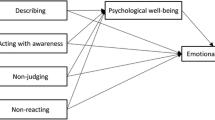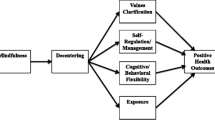Abstract
Objectives
Mindfulness has been shown to have beneficial effects with regard to improving well-being and lowering levels of distress. The Five Facet Mindfulness Questionnaire (FFMQ) has identified facets reflecting distinct mindfulness capacities, but it is not known yet to what extent they contribute individually to important outcomes such as well-being and distress. This study aimed to identify the most relevant facets and their unique contributions to distress and well-being to potentially enhance mindfulness-based interventions targeting these outcomes.
Methods
The present study assessed dispositional mindfulness, well-being and psychological distress in a sample of young adults (n = 239) and analyzed the differential contributions of mindfulness facets to distress and well-being outcome variables using stepwise multiple linear regression analyses.
Results
Individual differences in well-being and distress levels were best explained by different facets of mindfulness. The Nonreacting facet was the strongest contributor to well-being explaining 25% of variance in well-being scores, and after accounting for its contribution, Describing was the second largest contributor explaining additional 9%. In contrast, Acting with awareness was the strongest inverse contributor to distress explaining 20% variance and after controlling for it, Nonreacting explained merely 7% of additional differences in distress scores. After accounting for these main contributors, other facets explained only negligible amount of variance or were non-significant contributors.
Conclusions
The present study indicates that different capacities contribute differentially to well-being and distress. These findings may be useful for enhancing effectiveness of mindfulness-based interventions by tailoring practices to target well-being or psychological distress.
Similar content being viewed by others
References
Aikens, K. A., Astin, J., Pelletier, K. R., Levanovich, K., Baase, C. M., Park, Y. Y., & Bodnar, C. M. (2014). Mindfulness goes to work: impact of an online workplace intervention. Journal of Occupational and Environmental Medicine, 56(7), 721–731. https://doi.org/10.1097/JOM.0000000000000209.
Baer, R. A., Smith, G. T., & Allen, K. B. (2004). Assessment of mindfulness by self-report: the Kentucky Inventory of Mindfulness Skills. Assessment, 11(3), 191–206. https://doi.org/10.1177/1073191104268029.
Baer, R. A., Smith, G. T., Hopkins, J., Krietemeyer, J., & Toney, L. (2006). Using self-report assessment methods to explore facets of mindfulness. Assessment, 13(1), 27–45. https://doi.org/10.1177/1073191105283504.
Baer, R. A., Smith, G. T., Lykins, E., Button, D., Krietemeyer, J., Sauer, S., Walsh, E., Duggan, D., & Williams, J. M. G. (2008). Construct validity of the Five Facet Mindfulness Questionnaire in meditating and nonmeditating samples. Assessment, 15(3), 329–342. https://doi.org/10.1177/1073191107313003.
Bergin, A. J., & Pakenham, K. I. (2016). The stress-buffering role of mindfulness in the relationship between perceived stress and psychological adjustment. Mindfulness, 7(4), 928–939. https://doi.org/10.1007/s12671-016-0532-x.
Bohlmeijer, E., ten Klooster, P. M., Fledderus, M., Veehof, M., & Baer, R. (2011). Psychometric properties of the five facet mindfulness questionnaire in depressed adults and development of a short form. Assessment, 18(3), 308–320. https://doi.org/10.1177/1073191111408231.
Bowlin, S. L., & Baer, R. A. (2012). Relationships between mindfulness, self-control, and psychological functioning. Personality and Individual Differences, 52(3), 411–415. https://doi.org/10.1016/j.paid.2011.10.050.
Brown, K. W., & Ryan, R. M. (2003). The benefits of being present: mindfulness and its role in psychological well-being. Journal of Personality and Social Psychology, 84(4), 822–848. https://doi.org/10.1037/0022-3514.84.4.822.
Cash, M., & Whittingham, K. (2010). What facets of mindfulness contribute to psychological well-being and depressive, anxious, and stress-related symptomatology? Mindfulness, 1(3), 177–182. https://doi.org/10.1007/s12671-010-0023-4.
Garson, G. D. (2012). Testing statistical assumptions. Asheboro, NC: Statistical Associates Publishing.
Good, D. J., Lyddy, C. J., Glomb, T. M., Bono, J. E., Brown, K. W., Duffy, M. K., Baer, R. A., & Brewer, J. A.& Lazar, S. W. (2016). Contemplating mindfulness at work: an integrative review. Journal of Management, 42(1), 114–142. https://doi.org/10.1177/0149206315617003.
Grégoire, S., & Lachance, L. (2015). Evaluation of a brief mindfulness-based intervention to reduce psychological distress in the workplace. Mindfulness, 6(4), 836–847. https://doi.org/10.1007/s12671-014-0328-9.
Gu, J., Strauss, C., Bond, R., & Cavanagh, K. (2015). How do mindfulness-based cognitive therapy and mindfulness-based stress reduction improve mental health and wellbeing? A systematic review and meta-analysis of mediation studies. Clinical Psychology Review, 37, 1–12. https://doi.org/10.1016/j.cpr.2015.01.006.
Hawley, L. L., Rogojanski, J., Vorstenbosch, V., Quilty, L. C., Laposa, J. M., & Rector, N. A. (2017). The structure, correlates, and treatment related changes of mindfulness facets across the anxiety disorders and obsessive compulsive disorder. Journal of Anxiety Disorders, 49, 65–75. https://doi.org/10.1016/j.janxdis.2017.03.003.
Huang, S. L., Li, R. H., Huang, F. Y., & Tang, F. C. (2015). The potential for mindfulness-based intervention in workplace mental health promotion: results of a randomized controlled trial. PLoS ONE, 10(9), 1–16. https://doi.org/10.1371/journal.pone.0138089.
Huisman, M. (2000). Imputation of missing item responses: some simple techniques. Quality and Quantity, 34(4), 331–351. https://doi.org/10.1023/A:1004782230065.
Hwang, Y.-S., & Kearney, P. (2013). A systematic review of mindfulness intervention for individuals with developmental disabilities: long-term practice and long lasting effects. Research in Developmental Disabilities, 34(1), 314–326.
Hwang, Y.-S., Goldstein, H., Medvedev, O. N., Singh, N. N., Noh, J.-E., & Hand, K. (2019). Mindfulness-based intervention for educators: effects of a school-based cluster randomized controlled study. Mindfulness, 10(7), 1417–1436. https://doi.org/10.1007/s12671-019-01147-1.
Kabat-Zinn, J. (2003). Mindfulness-based interventions in context: Past, present, and future. Clinical Psychology: Science and Practice, 10(2), 144–156. https://doi.org/10.1093/clipsy/bpg016.
Kessler, R. C., Andrews, G., Colpe, L. J., Hiripi, E., Mroczek, D. K., Normand, S. L. T., Walters, E. E., & Zaslavsky, A. M. (2002). Short screening scales to monitor population prevalences and trends in non-specific psychological distress. Psychological Medicine, 32(6), 959–976. https://doi.org/10.1017/S0033291702006074.
Krägeloh, C. U., Henning, M. A., Medvedev, O. N., Feng, X. J., Moir, F., Billington, R., & Siegert, R. J. (2019). Mindfulness-based intervention research: characteristics, approaches, and developments. New York, NY: Routledge.
Leonardi, F. (2018). The definition of health: towards new perspectives. International Journal of Health Services, 48(4), 735–748. https://doi.org/10.1177/0020731418782653.
Malinowski, P., & Lim, H. J. (2015). Mindfulness at work: positive affect, hope, and optimism mediate the relationship between dispositional mindfulness, work engagement, and well-being. Mindfulness, 6, 1250–1262. https://doi.org/10.1007/s12671-015-0388-5.
Medvedev, O. N., Norden, P. A., Krägeloh, C. U., & Siegert, R. J. (2018a). Investigating unique contributions of dispositional mindfulness facets to depression, anxiety, and stress in general and student populations. Mindfulness, 9(6), 1757–1767. https://doi.org/10.1007/s12671-018-0917-0.
Medvedev, O. N., Titkova, E. A., Siegert, R. J., Hwang, Y. S., & Krägeloh, C. U. (2018b). Evaluating short versions of the Five Facet Mindfulness Questionnaire using Rasch analysis. Mindfulness, 9(5), 1411–1422. https://doi.org/10.1007/s12671-017-0881-0.
Muthén, B. O., & Kaplan, D. (1985). A comparison of some methodologies for the factor analysis of non-normal Likert variables. British Journal of Mathematical and Statistical Psychology, 38(2), 171–189.
Podsakoff, P. M., MacKenzie, S. B., Lee, J. Y., & Podsakoff, N. P. (2003). Common method biases in behavioral research: a critical review of the literature and recommended remedies. Journal of Applied Psychology, 88(5), 879–903.
Short, M. M., Mazmanian, D., Oinonen, K., & Mushquash, C. J. (2016). Executive function and self-regulation mediate dispositional mindfulness and well-being. Personality and Individual Differences, 93, 97–103. https://doi.org/10.1016/j.paid.2015.08.007.
Siegling, A. B., Furnham, A., & Petrides, K. V. (2018). Facet Benchmarking: advanced application of a new instrument refinement method. Personality and Individual Differences, 120, 288–298.
Slonim, J., Kienhuis, M., Di Benedetto, M., & Reece, J. (2015). The relationships among self-care, dispositional mindfulness, and psychological distress in medical students. Medical Education Online, 20(1), 27924. https://doi.org/10.3402/meo.v20.27924.
Soysa, C. K., & Wilcomb, C. J. (2015). Mindfulness, self-compassion, self-efficacy, and gender as predictors of depression, anxiety, stress, and well-being. Mindfulness, 6(2), 217–226. https://doi.org/10.1007/s12671-013-0247-1.
Spijkerman, M. P. J., Pots, W. T. M., & Bohlmeijer, E. T. (2016). Effectiveness of online mindfulness-based interventions in improving mental health: a review and meta-analysis of randomised controlled trials. Clinical Psychology Review, 45, 102–114. https://doi.org/10.1016/j.cpr.2016.03.009.
Stewart-Brown, S., Tennant, A., Tennant, R., Platt, S., Parkinson, J., & Weich, S. (2009). Internal construct validity of the Warwick-Edinburgh Mental Well-Being Scale (WEMWBS): a Rasch analysis using data from the Scottish Health Education Population Survey. Health and Quality of Life Outcomes, 7, 1–9. https://doi.org/10.1186/1477-7525-7-15.
Strohmaier, S., Jones, F. W., & Cane, J. E. (2020). Effects of length of mindfulness practice on mindfulness, depression, anxiety, and stress: a randomized controlled experiment. Mindfulness. https://doi.org/10.1007/s12671-020-01512-5.
Tomlinson, E. R., Yousaf, O., Vittersø, A. D., & Jones, L. (2018). Dispositional mindfulness and psychological health: a systematic review. Mindfulness, 9, 23–43. https://doi.org/10.1007/s12671-017-0762-6.
Funding
This study is part of doctoral work of the first author. The study was funded by the New Zealand Defence Force.
Author information
Authors and Affiliations
Contributions
AR conducted the data analyses and wrote the manuscript. AS collaborated with writing and editing of the manuscript. CG collaborated with the design and the data collection and edited the manuscript. OM collaborated with the data analyses, writing, and editing of the manuscript. All authors approved the final version of the manuscript for submission.
Corresponding author
Ethics declarations
Conflict of Interest
The authors declare that they have no conflict of interest.
Ethical approval
This research was approved by the Ethics Committee of the New Zealand Defence Force.
Informed Consent Statement
All participants provided informed consent prior to completing this study.
Additional information
Publisher’s Note
Springer Nature remains neutral with regard to jurisdictional claims in published maps and institutional affiliations.
Rights and permissions
About this article
Cite this article
Roemer, A., Sutton, A., Grimm, C. et al. Differential Contribution of the Five Facets of Mindfulness to Well-being and Psychological Distress. Mindfulness 12, 693–700 (2021). https://doi.org/10.1007/s12671-020-01535-y
Accepted:
Published:
Issue Date:
DOI: https://doi.org/10.1007/s12671-020-01535-y




